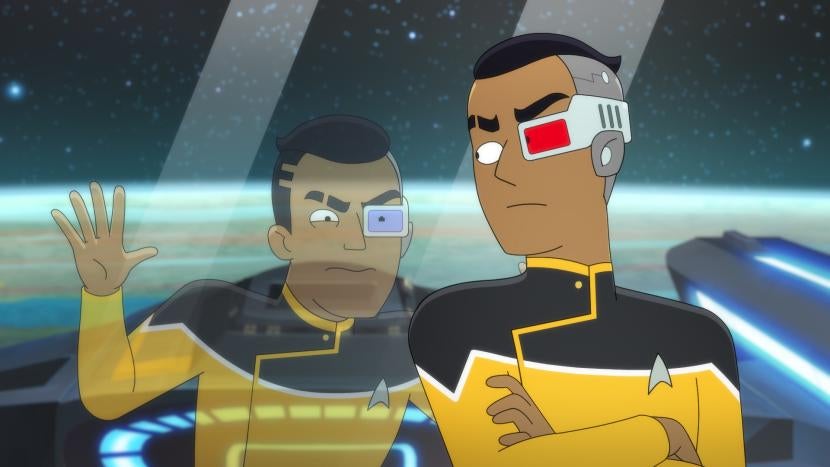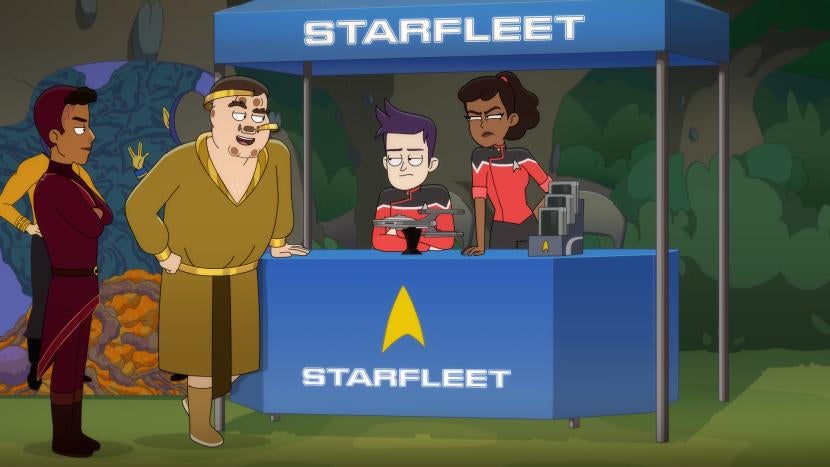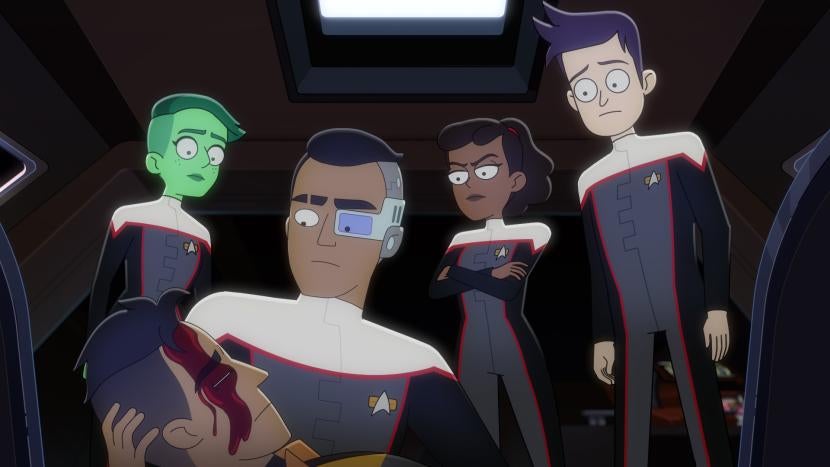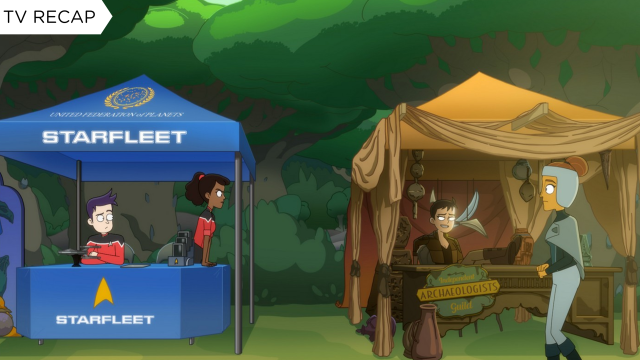Star Trek: Lower Decks’ third season has struggled to find a point for itself, regressing its ensign heroes and relying on the charms of its pastiche rather than the growth of its characters to find something to say — a charm that was beginning to quickly run out. Thankfully, at the season’s halfway mark it decided to remind us just why we love this show in the first place.

In fact, if anything, all I could possibly complain about in “Reflections” is that both its A and B-plots were so interesting and well executed I almost wish that both got their own episodes to be focused on — but after four weeks of uncertain doubt about the show, I will gladly take “there is literally too much of a good thing going on” as a concern.

This is because “Reflections” delivers on three key fronts that have been severely lacking from Lower Decks’ third season, plagued as it has been by going back and forth on just exactly it wants to do with its ensign protagonists, awkwardly shunting their prior growth as characters around to tread water. Firstly, there’s the delivery of a brutally funny, scathing, and yet loving indictment of just what the hell Starfleet is in the A-plot, which sees Boimler and Mariner assigned with Starfleet recruitment booth duty on a nearby planet, only to have their marketing pitches skewered by a dashing independent archaeologist named Petra Aberdeen (guest star Georgia King) — Star Trek does love itself a saucy archaeologist from time to time, of course. Then in the B-plot, there’s the long-awaited exploration of Rutherford’s past and his implant, when an attempt to fix a string of sleepless nights leads to his body being taken over by a rebellious vestige of his psyche from his pre-Starfleet youth. Lastly, there’s the fact that both of these plots actually culminate with the promise of actual growth for two of our main characters. Look at that! That’s an episode of television right there, and it only took half the season to get there.
Let’s dive into the A-plot a bit more. Mariner is consigned to the recruitment booth by Ransom as part of his ongoing management of her performance, and the key struggle here is that she has to balance doing her job — pitching Starfleet to the locals as an exciting adventure — while the nearby Petra, from her own archaeologist guild booth, expertly skewers all those promises. It’s the sort of deeply nerdy humour that Lower Decks is at its best with: not necessarily loving pastiche of Star Trek, but the questions we all constantly think about its world. In this case, it’s primarily if whether or not Starfleet is the exploratory scientific organisation it pitches itself to people as, or if it’s really the quasi-military that… well, that it really is. Can Starfleet really be about discovering the undiscovered country, as Mariner is forced to bleat, if most of the time it’s actually about trying not to be assimilated by the Borg, or getting in disputes with the Klingons, or the Romulans, or the Cardassians (a potent reminder that Lower Decks is not *that* far removed from the aftermath of the Dominion War!)? Can a career in Starfleet really promise safety, freedom, and scientific curioisity if it acts and dresses like a military? And just why do they change those damn things every few years?

Hilariously, it’s not Mariner who breaks under this needling, but Boimler, who loses his entire shit when a passing outpost scientist mocks his rank pip and removes it from his uniform. Just as nerdily fan-based as Petra and passers-bys’ needling of Starfleet as a recruitment drive are, Boimler’s furious defence of why Starfleet matters in spite of all this is equally plucked right out of fan debates. Instead of just nudging at us if we know which Star Trek the show is referencing, this is the first bit of pastiche this season that truly feels like Lower Decks at its best: treating its characters as Star Trek fans who just happen to exist in Star Trek.
It’s not the only twist on that idea “Reflections” has though. The B-plot reveals just what has made an edgier personality overtake Rutherford’s body: a pre-implant version of his younger self, an Academy skiver who used his engineering prowess not to prepare for a career in space, but build and race illegal ships. In many ways, as Rutherford’s internal selves bicker with each other over who will get to control their body — his implants and damaged brain mean there’s only room for one — there’s parallels to the needling between Petra and Mariner in the A-plot. What happened to himself, the younger Rutherford wonders, that he went from an angry, rebellious man to the conformity of a nerdy Starfleet grunt who’d rather say “oopsie doodle” than “shit?” How did he go from using his abilities as an engineer to follow his own passions, to someone willing to spend their life fixing someone else’s problems? What could possibly be worth living that life to his angry, passionate young self?

The answer, as the Rutherford’s metaphysical race to control their singular body reveals, is ultimately the friendships Samanthan has made among his fellow Lower Deckers. He’s no longer angry as he once was, at either the world around him or himself, and he’s no longer alone — he’s channelling his passions healthily instead of into something that could’ve got him killed. “I have friends who care for me” might be the lovey-dovey conclusion to finally getting to explore Rutherford’s past, just as Mariner not falling for Petra’s jibes — eventually, we learn she was trying to provoke a scene so she could purloin an artefact (none other than the rod of the Ferengi Grand Nagus — how on Ferenginar did Rom lose that!?) — is in the A-plot that would let Lower Decks comfortably swoop this growth under the bed as an isolated story arc. Thankfully, “Reflections” excels in letting these revelations linger. Mariner sees Petra, after years of being told by her mother and her superiors that they don’t believe she can mould herself into Starfleet, as a potential escape to a life better suited for her — even if it means leaving her friends behind. Rutherford meanwhile, dislodges the memory of him receiving his implant, revealing that it’s the result of an accident on a secret Starfleet project, and was designed to mask his involvement in it.
These are actual, tangible plot threads for Lower Decks’ third season to continue to mine, and crucially, they at long last reflect a level of growth in our characters beyond one-off adventures. That’s something that, up until now, the third season was distinctly struggling to articulate, as it went back on forth on just what these characters should be at this point. We can only hope it can keep this energy up for the rest of the season.
Want more Gizmodo news? Check out when to expect the latest Marvel and Star Wars releases, what’s next for the DC Universe on film and TV, and everything you need to know about House of the Dragon and Lord of the Rings: The Rings of Power.
Editor’s Note: Release dates within this article are based in the U.S., but will be updated with local Australian dates as soon as we know more.
